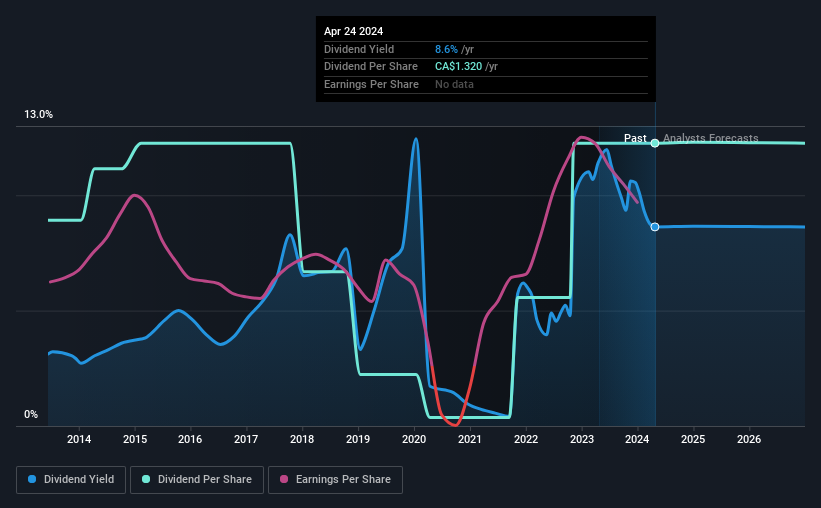Peyto Exploration & Development Corp. (TSE:PEY) Stock Goes Ex-Dividend In Just Four Days
Some investors rely on dividends for growing their wealth, and if you're one of those dividend sleuths, you might be intrigued to know that Peyto Exploration & Development Corp. (TSE:PEY) is about to go ex-dividend in just four days. The ex-dividend date is one business day before a company's record date, which is the date on which the company determines which shareholders are entitled to receive a dividend. The ex-dividend date is an important date to be aware of as any purchase of the stock made on or after this date might mean a late settlement that doesn't show on the record date. Accordingly, Peyto Exploration & Development investors that purchase the stock on or after the 29th of April will not receive the dividend, which will be paid on the 15th of May.
The company's next dividend payment will be CA$0.11 per share. Last year, in total, the company distributed CA$1.32 to shareholders. Looking at the last 12 months of distributions, Peyto Exploration & Development has a trailing yield of approximately 8.6% on its current stock price of CA$15.30. Dividends are an important source of income to many shareholders, but the health of the business is crucial to maintaining those dividends. That's why we should always check whether the dividend payments appear sustainable, and if the company is growing.
See our latest analysis for Peyto Exploration & Development
Dividends are typically paid out of company income, so if a company pays out more than it earned, its dividend is usually at a higher risk of being cut. Its dividend payout ratio is 81% of profit, which means the company is paying out a majority of its earnings. The relatively limited profit reinvestment could slow the rate of future earnings growth. We'd be concerned if earnings began to decline. Yet cash flows are even more important than profits for assessing a dividend, so we need to see if the company generated enough cash to pay its distribution. The company paid out 97% of its free cash flow over the last year, which we think is outside the ideal range for most businesses. Companies usually need cash more than they need earnings - expenses don't pay themselves - so it's not great to see it paying out so much of its cash flow.
Peyto Exploration & Development paid out less in dividends than it reported in profits, but unfortunately it didn't generate enough cash to cover the dividend. Were this to happen repeatedly, this would be a risk to Peyto Exploration & Development's ability to maintain its dividend.
Click here to see the company's payout ratio, plus analyst estimates of its future dividends.
Have Earnings And Dividends Been Growing?
Stocks in companies that generate sustainable earnings growth often make the best dividend prospects, as it is easier to lift the dividend when earnings are rising. If earnings fall far enough, the company could be forced to cut its dividend. Fortunately for readers, Peyto Exploration & Development's earnings per share have been growing at 14% a year for the past five years. Earnings have been growing at a decent rate, but we're concerned dividend payments consumed most of the company's cash flow over the past year.
Peyto Exploration & Development also issued more than 5% of its market cap in new stock during the past year, which we feel is likely to hurt its dividend prospects in the long run. Trying to grow the dividend while issuing large amounts of new shares reminds us of the ancient Greek tale of Sisyphus - perpetually pushing a boulder uphill.
Many investors will assess a company's dividend performance by evaluating how much the dividend payments have changed over time. Peyto Exploration & Development has delivered 3.2% dividend growth per year on average over the past 10 years. Earnings per share have been growing much quicker than dividends, potentially because Peyto Exploration & Development is keeping back more of its profits to grow the business.
Final Takeaway
Should investors buy Peyto Exploration & Development for the upcoming dividend? It's good to see that earnings per share are growing and that the company's payout ratio is within a normal range for most businesses. However we're somewhat concerned that it paid out 97% of its cashflow, which is uncomfortably high. Overall we're not hugely bearish on the stock, but there are likely better dividend investments out there.
With that being said, if dividends aren't your biggest concern with Peyto Exploration & Development, you should know about the other risks facing this business. To help with this, we've discovered 3 warning signs for Peyto Exploration & Development that you should be aware of before investing in their shares.
A common investing mistake is buying the first interesting stock you see. Here you can find a full list of high-yield dividend stocks.
Have feedback on this article? Concerned about the content? Get in touch with us directly. Alternatively, email editorial-team (at) simplywallst.com.
This article by Simply Wall St is general in nature. We provide commentary based on historical data and analyst forecasts only using an unbiased methodology and our articles are not intended to be financial advice. It does not constitute a recommendation to buy or sell any stock, and does not take account of your objectives, or your financial situation. We aim to bring you long-term focused analysis driven by fundamental data. Note that our analysis may not factor in the latest price-sensitive company announcements or qualitative material. Simply Wall St has no position in any stocks mentioned.

 Yahoo Finance
Yahoo Finance 
